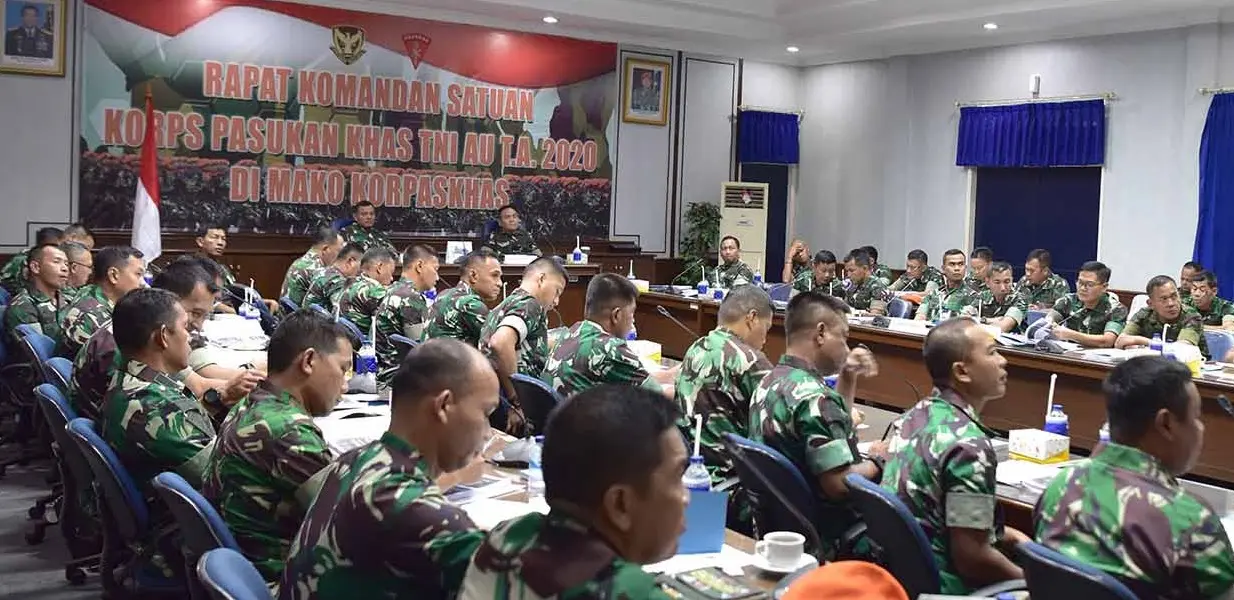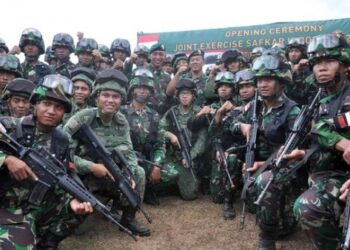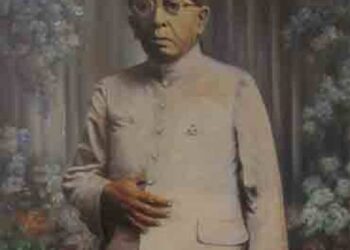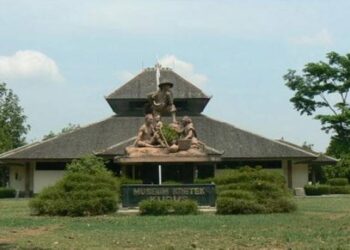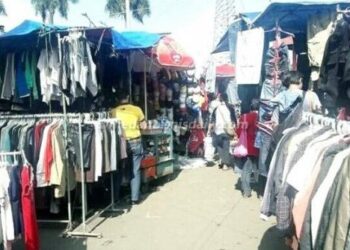Disagreements In Armed Forces of Republic Indonesia
Since its founding in 1945 ABRI has never been free of various opinions that differ from each other. This can be seen because the ABRI or TNI stands on the basis of the revival of the people and since its inebritation was established not only as an organization of the armed forces as in other countries. Because the TNI stands on the basis of the revival of the people, then in this TNI developed various opinions that exist in the community. But because of the common cause of the struggle and one, the unity and unity of the TNI can be maintained.
In Indonesia, the TNI holds a significant position in the life of the nation, so it is not uncommon for organizations outside the TNI and especially political organizations, as well as trying to influence the TNI to side with the organization, for example the G30S/PKI event, the DI/TII Rebellion and PRRI/Permesta. Because of this unity and unity should always be a concern of ABRI leadership. Because the difference of opinion among the TNI or ABRI is considerable influence on the TNI and ABRI itself, it must be done to idenification of those differences as a lesson and experience so as not to repeat itself.
The Difference Between The Former PETA (PEMBELA TANAH AIR) And The Former KNIL (Koninklijk Nederlands Indisch Leger)
The first important difference experienced by the TNI was the disagreement between the officers who were the former Peta and the former KNIL. The main cause of this difference is the relatively young age difference of the majority of the two officer categories between the former Peta and the former KNIL. A young age with ambition holds power so as to elicit strong emotions. Because the majority of the former Peta is a platoon commander, who is still around 25 years old. Similarly, the majority of former KNIL are also no more than the age of 30. Even there was a sense of discontent when a former Peta was placed under a former KNIL, this occurred because at a young age that a person had strong ambitions, especially in military organizations the power factor was very much his influence. In the discontent that speaks is emotion, it can be seen when the former Peta said that the former KNIL lacked passion and nationalism and knew only the mere theory and that was evident when KNIL soldiers bowed to the Japanese army very quickly. On the contrary, the former KNIL did not say that Peta’s officers had only a passion without any knowledge of dreaming of soldiers. It is clear that the opinions of both parties are based only on subjective things. Because in fact all parties, the former Peta and the former KNIL are equally inexperienced to run a wide-ranging war.
The opposition has had quite a detrimental impact in the form of various suspicions and prejudices between individuals and TNI units. But this opposition only disappeared after the TNI-AD began in 1952 seriously and systematically held the officer education system. In this education, a person proves his prowess, no matter if he is a former Peta, former KNIL, or other former. Then after education, he proved how proficiency on the field or on the staff. So that an officer is judged according to his prowess and no longer arises a conflict between the former Peta and the former KNIL
Animosity Between Armed Forces of the Republic Indonesia
In ABRI there has been animosity and even opposition of certain units. This posed a threat to Abri and the safety of the country and nation. In addition to the conflict between the units in the TNI-AD force, there is also animosity between the forces and each other. This is not separated from political influence. The main reason for opposition or competition is not separated from the desire to value who is most important in our country, so that it gets high judgment from the public and gets more budget from the state. The first to feel strong is Brimob. Brimob received more complete weaponry facilities than the TNI-AD because Brimob was under the prime minister. However, the truth is that the animosity between the generations occurred between 1960 and 1966 as a result of President Sukarno’s politics being influenced by the PKI. President sukarno was in a battle with the TNI-AD because at that time the TNI-AD became a barrier for the PKI to reach the peak of power in Indonesia.therefore Sukarno immediately took the decision to give all forces or departments. All of that under the leadership of the commander-in-chief of ABRI, namely the President of the Republic of Indonesia. That’s the PKI’s way of preparing for its uprising in 1965.
In 1945 indo nesi seemed to have the tone of four armed forces. Because each force has its elements, its land combat, its sea combat, and its air combat, each angkata has elements that are no exception to the police. These four were fighted by political people, especially the PKI. The rivalry or opposition between the forces was only fewer and he was ified after the integration of ABRI in 1969. The oprasi control command is in the hands of ABRI. After the ministry or department is removed and the designation of the leader of the force is no longer the commander in chief of staff of the force.
The downside of ABRI integration is the presence of police in ABRI. The police are becoming less functional as they function. This was due to politics from 1960 to 1965. Police should be able to break away from ABRI. But the police must be guaranteeed to have dignity in the community. The police can do that when supported in terms of materials and personnel, but that is not all in the police.
Read also :
TNI Logistics Handling – ABRI Leadership Book
TNI Leadership In History And Struggle – Book Reviews
The Difference of Opinion on TNI – Summary of ABRI Leadership Book
The Role of TNI in National Development – Summary of ABRI Leadership Book
Events Of October 17, 1952
The events of October 17 are the events that are in the body of the TNI-AD. This was due to the conflicting impact of the former Peta and the former KNIL as well as the role of political parties that over-meddled in the affairs of the ABRI body. There were politicians who before 1950 joined the Netherlands and in 1950 managed to enter the House of Representatives and also criticized the TNI-AD for its dislike of the TNI-AD managed to make the Republic of Indonesia States into The Unitary State of the Republic of Indonesia.
In the body of the TNI-AD, there are several officers in high positions who in addition to being dissatisfied with the development of the TNI-AD, are also less satisfied with the position it obtains. This dissatisfaction resulted in opposition in the stronghold of the Army-AD officers in Java. The House of Representatives is aware of the opposition in the TNI-AD because in the members of the House of Representatives there are young members who have joined the Netherlands and they are not happy about the success of the TNI-AD invites the people to leave the existence of RIS state then this becomes an opportunity for the House of Representatives to take all-out and retaliation. This was not accepted by the AP and the TNI-AD. Al was the result of the TNI-AD’s decision to confront President Sukarno to dissolve the House of Representatives and take over the leadership of the country. This is where the leadership of the Army made a big mistake. President Sukarno rejected the request. The TNI-AD began receiving blows and attacks from various parties and cracked the TNI-AD. The TNI-AD split extended throughout the corps of officers, including out of Java.
Gradually came to the conclusion that there must be a resenter of the split. So a meeting was held in Yogyakarta in 1955 attended by officers to conduct reconciliation between all the dissenting parties. Reconciliation can be fulfilled in the fulfilled promise of all who attend and are spoken in front of the tomb of the commander-in-chief Sudirman. Although formal reconciliation has been achieved, but in fact has not fully recovered, it will be the cause of another rift when the real Colonel Nasution has become a civilian politician as the leader of the IPKI party, by the leadership again appointed as KSAD in the rank of brigadier general. This led to the dissatisfaction of officers outside Java, and led to a PRRI/Permesta rebellion. The appointment was only approved by colonel Sudirman.
The appointment was done again, namely the appointment of Colonel Bambang Utoyo. This appointment faced a harsh challenge from the majority of Army officers, because it was considered disrespectful to the results of the meeting held in Yogyakarta.
The events of 17 October are not separated from the activities and influence of political parties. Young TNI officers can still be influenced by politicians to be soft targets for victory.
Events In The TNI-AU and TNI-AL
The absence of non-aviator leaders into the TNI-AU made the aviators dissatisfied. Indeed, no air force had a leader not an aviator in the 1950s. So the aviators expressed dissatisfaction with the KSAU(Chief of Staff the Air Force) leadership Indonesia. Several aviator officers resigned. They are generally aviators educated in India. Suyono’s KMU(Chief Marshal of the Air Force) movement in favor of KSAU violated the rules when writing a letter to the House of Representatives. In the next process, Suyono and his comrades were removed from the Air Force. It has been revealed that both the events of October 17 and the AU event of 1953 were the result of political parties.
This is the lesson that must be withed that has been mentioned before. Political parties seek to spread and disseminate and strengthen their positions in the power of ABRI. Usually, political parties take advantage of several factors that live in the environment of ABRI officers. Another factor is the personal ambition of officers. Usually, young officers who want to quickly occupy high positions.
In the TNI-AL there was also a problem between the KSAL, admiral Subiyakto, and his senior officers in 1959. There was a movement led by Lt. Col. Yos Sudarso and Lt. Col. Alisadikin who demanded the replacement of the KSAL. The officers said that KSAL was too authoritarian and did not allow its officers to develop their initiatives in which case there was no political influence that might be biased to influence these events.
However, at the beginning of 1965 some events occurred in the TNI-AL which was influenced by political parties. The PKI can influence young officers to take action against the leadership of the TNI-AL. TNI-AL leadership has the high discipline and no feeling of oppression. The incomprehension of the young officers as well as the intrigue of the PKI towards both sides of the TNI-AL lost many young officers. Only certain factors are influenced by political parties.
Effects Of The Cold War
Since 1948 the world has been divided by the cold war between the Western bloc and the communist bloc, although they were allied in the second world war against Germans, Italians, and Japanese. The subject matter is in ideology. The Soviet Union wanted to make humanity accept communists as its lifeline. Meanwhile, the western bloc led by America wants to make humanity use Western understanding. From that angle, it can be said that the Western bloc is a power status quo, while the Communist bloc is a reforming power.
The power of communist renewal that was indeed at that time of humanity using western understanding was very difficult to do. Many of humanity cannot accept the reforms carried out by the communists because the reforms are far from justice. Because the communist renewal is only an improvement for people who share the communists only. Therefore the nation that does not want to follow the understanding of the communists then the renewal of the communists is much to be expected.
It was called the cold war because between the western bloc and the communist bloc there was a high-level confrontation in all aspects of life and not until the war with weapons. In fact, Indonesia does not have two opposing strongholds but the two camps want Indonesia to side with one of the two strongholds. The struggle between the two strongholds affected ABRI. That was already seen in 1948 when the communists sought to seize power over the Republic of Indonesia and use the armed forces as the main means. At that time there was a conflict between the Communist-sided ABRI and the Other Republic of Indonesia. It was only at that time that the communist-sided majority was ABRI. Opposition re-emerged in the mid-1950s. However, the role of the West resulted in a PRRI/Permesta rebellion. ABRI officers outside Java were influenced by the US, especially through an intelligence agency called the CIA, that Jakarta was already controlled by communists. Actually, officers who are outside Java know enough of their colleagues in Java. They knew of officers in Java who were affected by communists.
The G30S/PKI uprising in 1965 instead demonstrated the success of the communists to influence ABRI officers to support their efforts. However, the officers and members of ABRI, especially the TNI-AD who are still guided to Pancasila are still strong enough and able to overcome the rebellion. Although the rebellion received the blessing of President Sukarno. But God’s will is still stronger. Within 6 months the rebellion can be stopped.
During the cold war between the two blocs, there was still influence over Indonesia, as ABRI had a strong influence in the course of politics in Indonesia. So it makes sense that ABRI still gets influence from the two dissenting blocs. After the completion of the G30S/PKI ABRI rebellion has begun to be safe from the influence of disputes from the two blocs. By no longer feeling the danger of division in ABRI. But there are still people who want to pit sheep inside the ABRI. In the ABRI that has been held by the younger generation, there is a sharp opposition of opinion. However, it was prevented before the split after Suharto took appropriate steps to address the issue. There is no need for that opposition due to the influence of large countries that have particular interests in Indonesia.
That suggests that once the Cold War was gone, the danger of outside influence on the ABRI remained. Especially if other countries have a great interest in the political and economic changes in Indonesia.
Debate Opinions Arising, SPECIAL OPERATIONS (OPSUS)
When Indonesia held a confrontation with Malaysia within the Kostrad(Army Strategic Reserves Command of Indonesia) organization in the form of an intelligence organization called operasi khusus(Special Operations) in short OPSUS. The activity was led by Ali Murtopo who was his post at the time deputy assistant intelligence Kostrad.
After connotations with Malaysian the end when Indonesia entered the New Order, Opsus’ activities continued, and instead created its own formation in the intelligence environment, outside of existing intelligence organizations. OPSUS activities were used by Suharto for special activities outside the TNI-AD. Mustopo agility makes Opsus more numerous members. The people are from ABRI as well as from civil and self-sufity circles. People are attracted to OPSUS because there are various foundations and one of them because they want to get progress and get security guarantees.
In the confrontation with Malaysia, there was no disagreement between OPSUS and the TNI-AD. But in the time of the New Order there was a rift in that power. Because of the rift because Ali Murtopo an ambitious man did not hesitate to use his organization in self-interest sometimes also ignored the will of Suharto which caused dissent between the TNI-AD and OPSUS.
After his time as an assistant to Mr. Harto Ali Murtopo it was easier to move in political affairs than the officers of the TNI-AD. In his activities, it is not uncommon for Ali Murtopo to run it differently from the officers of the TNI-AD.
Ali and Sudjono formed the official body for research, the CSIS (Centre for Strategic and International Studies). In CSIS it gathers people from non-indigenous and religious minorities. This activity is used to bring other countries closer together. The goal is to bring non-indigenous entrepreneurs closer to foreigners so that by themselves non-indigenous entrepreneurs make a donation to CSIS because it feels like it has been made easier. CSIS could be the government’s main think-tank. Therefore it has a strong influence on all the wisdom that the government does, both in the field of economy, politics, and security.
The conflict between Opsus’s chlorine and General Sumitro’s Pangkokamtib(Security and Order Restoration Command) exploded during a malaria event on February 15, 1974. At that time there was a massive demonstration that was joined by the destruction by youth and students, when the prime minister of Japan Kakuei Tanaka was dating to Indonesia. This demonstration voiced his dislike of the Japanese company. The malaria event was a blow to Opsus and CSIS who fostered Japanese and non-indigenous entrepreneurs because of the negative impact on Indonesia.
After the malari event, the influence and power of Opsus and CSIS grew. With the removal of General Sumitro from his post, also all officials in the ABRI and especially the TNI-AD who were in value close to him were deprived of his handshake. OPSUS gained dominance from intelligence in Indonesia. Alimurtopo’s gait is soaring and unbiased in the balance by generals who are not from opsus. In terms of politics Ali murtopo was raised to be the minister of information. Similarly, Beny Murdani was raised to a higher intelligence. Instead he became his intelligence commander. With the appointment of Beni Murdani Pangab already come certainly OPSUS forces and CSIS got a strong wind. It is clear that ABRI and the TNI-AD were already in another situation with the TNI-AD in the 1945 generation.
However, there appears to be a change in President Suharto’s level of trust since 1988. Perhaps a change in Mr. Harto’s attitude to Alimurtopo in 1982, which was caused by political problems. As a result, the relationship with Beny becomes loose. CSIS’s finances are great and its international relations remain strong, so there is no indication of Opsus and the challenges are already in its history. ABRI and TNI-AD can re-develop in accordance with the ABRI tradition that is close to the community.
OPSUS case is unique, because in his opposition to the general line of leadership of the TNI-AD Opsus is not influenced by political parties. The political goals fought for stems from OPSUS leadership itself and not from outside.
Read also :
TNI Logistics Handling – ABRI Leadership Book
TNI Leadership In History And Struggle – Book Reviews
The Difference of Opinion on TNI – Summary of ABRI Leadership Book
The Role of TNI in National Development – Summary of ABRI Leadership Book
BIBLIOGRAPHY
1. Sejarah Militer, ringkasan buku “Kepemimpinan Abri Dalam Sejarah Dan Perjuangan” halaman 246-297.






